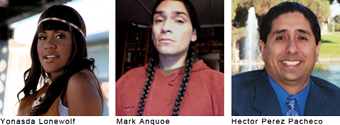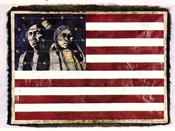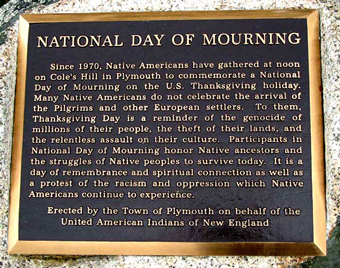Native Americans explain why "Thanksgiving"holiday is celebration of genocide
By Charlene Muhammad -National Correspondent- | Last updated: Oct 24, 2017 - 12:32:17 PMWhat's your opinion on this article?
No thanks to Thanksgiving

|
“We’re certainly not against giving thanks. As indigenous people we give thanks every day ... The issue here with the Thanksgiving holiday as celebrated in the United States is that it perpetuates this myth that the wonderful Pilgrims came here from Europe and were so kind and good to the Native people who were here and lived happily ever after,” said Mahtowin Munro, co-leader of the United American Indians of New England.

|
That is part of why every year, her organization holds a National Day of Mourning in Plymouth, Mass., to honor Native ancestors and current struggles of Native people. This year marks the 42nd gathering.
Native Americans have the highest rate of suicide in the U.S. at 16.25 per 100,000 for 2002-2006 per the Centers for Disease Control, she noted. Millions upon millions of Native Americans have died in European-perpetrated genocide, just as Africans did. And the root of America’s wealth really is in the theft of indigenous land, the genocide of Native people, and the enslavement of Black men and women, Ms. Munro continued.

|
“The biggest issue facing us is poverty and unemployment. In many states where there’s a larger Native population, our unemployment figures are much, much higher than for White people. In the Northern Plains, for instance, unemployment is around 50 percent and Alaska is very bad, too,” Ms. Munro said.
Other struggles include the continuing theft of traditional lands by the U.S. government and corporations, and less access to decent health care. And in addition, she’s concerned over the lack of educational opportunities for Native children.
According to Ms. Munro, people who have attended the Day of Mourning have returned to their homes and told the truth to their families at the Thanksgiving table.
“I think a lot of people want to know the truth about history and what’s going on in this country and Occupy Wall Street is indicative of that, people trying to break free of mental shackles and understand things and speak with each other,” Ms. Munro said.
Mark Anquoe, of the International Indian Treaty Council and American Indian Movement, agrees that there’s nothing wrong with giving thanks and feels that the day gives families an opportunity to openly dialogue about what really occurred.
“What happened is not just some harmless lie that can be overlooked with a wink and a smile,” Mr. Anquoe told The Final Call. He recalls being six- and seven-years-old and instructed to dress in costume as a Pilgrim or Indian at school.
“I knew something was wrong, but I couldn’t put my finger on it. As I grew older, my confusion grew into anger when I realized what had been perpetrated on me, he said. “The modern practice of Thanksgiving makes mockery of our people and that affects children’s self-esteem and emotional growth. Native children have some of the highest suicide rates in the country and that’s part of it,” Mr. Anquoe added.
America’s account of Thanksgiving disregards the American Indian Movement, the “Longest Walk,” from San Francisco to Washington, D.C. to raise awareness about indigenous sacred sites in 1978, and the massacres of the 1700s, 1800s and 1900s, said hip-hop artist and activist Yonasda Lonewolf Muhammad.
“Even when you look at the Macy’s Thanksgiving Day Parade, they don’t even showcase the Native American issue. They focus more on balloons, Broadway plays, and even bring out a big, ole’ turkey, but they don’t show Native Americans and their influence on America,” she said.
Ms. Muhammad said thankfully, her late mother, Wauneta Lonewolf, an activist and full-blood Oglala Sioux from Pine Ridge, South Dakota, embraced Thanksgiving as a Day of Mourning. Her family marked the day from a similar perspective as many Blacks, as time to be with family.
Instead of false pageantry, children’s school projects should include in-depth research about what happened to the first contact tribes and their population counts then and now, she added.
In addition, said Hector Perez Pacheco of the Aztlan Mexica Nation Harmony Keepers, a warrior society that works to protect Native Americans’ sacred ceremonies, Native Americans continue to experience intergenerational trauma in the form of alcoholism, drug abuse and violence, and indigenous nations are continuously denied their sovereignty rights.
“The way that mainstream society has described the actual occurrence of what took place is incorrect. It’s false,” Mr. Pacheco said. Some people think that Native Americans are doing well because they see the gambling casinos owned by several tribes, but we are suffering like everybody else, he said.
Many Native peoples are prevented from speaking their language or practicing their traditions, but there are ways to uplift the culture and not remain in the past or have negativity associated with their history, he told The Final Call.
One way is to start speaking truth around Thanksgiving tables, Mr. Pacheco said. A second way is to talk to the victims of boarding schools, where Native children were placed and stripped of their language and culture. Another is to revive the Native traditions and culture to provide pride and dignity as a people.
“It is a step by step process toward not staying in the negative. Yes, that’s a part of the process but it shouldn’t be the end,” Mr. Pacheco said.
(Originally Web Posted: NOV 22, 2011)
Related news:
INSIDE STORIES AND REVIEWS
-
-
About Harriett ... and the Negro Hollywood Road Show
By Rabiah Muhammad, Guest Columnist » Full Story -
Skepticism greets Jay-Z, NFL talk of inspiring change
By Bryan 18X Crawford and Richard B. Muhammad The Final Call Newspaper @TheFinalCall » Full Story -
The painful problem of Black girls and suicide
By Charlene Muhammad -National Correspondent- » Full Story -
Exploitation of Innocence - Report: Perceptions, policies hurting Black girls
By Charlene Muhammad -National Correspondent- » Full Story -
Big Ballin: Big ideas fuel a father’s Big Baller Brand and brash business sense
By Bryan Crawford -Contributing Writer- » Full Story






 Click Here Stay Connected!
Click Here Stay Connected!








